
For fans of the England national football team, the last few years have been exciting indeed. The Three Lions have experienced a true renaissance under manager Gareth Southgate, reaching the semi-finals of the 2018 World Cup and the 2018-19 UEFA Nations League, and Southgate’s young, vibrant team now go into next summer’s European Championships as one of the favourites to win the tournament.
England fans should proceed with caution, though; around fifteen years ago another England side – usually known as ‘The Golden Generation’ – emerged with plenty of talent and promise and went into a handful of major tournaments (Euro 2004, World Cup 2006, World Cup 2010) amongst the favourites to win, only to fall short.
But have Southgate’s modern-day England side now surpassed their Golden Generation counterparts? We compare the two sides here.
Goalkeepers: Paul Robinson, David James, Robert Green vs. Jordan Pickford, Nick Pope, Tom Heaton
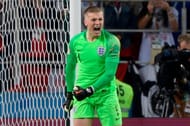
One area in which the Golden Generation struggled was between the sticks; Sven-Goran Eriksson’s side never had a truly world-class goalkeeper, and Fabio Capello’s later Golden Generation side narrowly missed out on the services of Joe Hart, who was genuinely great in his early England tenure.
David James, then of West Ham and Manchester City, was a solid shot-stopper and performed well in Euro 2004, while Paul Robinson of Tottenham was first choice at the 2006 World Cup, but neither keeper was outstanding, and Robinson infamously made a major gaffe against Croatia in a qualifier for Euro 2008.
Fabio Capello’s first choice going into the 2010 World Cup was Robert Green, but the West Ham keeper made a huge error in England’s opening match against the USA – letting Clint Dempsey’s shot squirm through his fingers – and was subsequently dropped in favour of James for the remainder of the tournament.
Southgate, meanwhile, has used Jordan Pickford of Everton as his first choice keeper since November 2017, and while his club form has been questionable at times, he’s been largely excellent for England. His penalty save from Carlos Bacca helped the Three Lions to win their first penalty shootout in over 20 years against Colombia in the 2018 World Cup, and his brilliant distribution has contributed to some of England’s best goals in recent games.
Nick Pope and Tom Heaton are largely unproven as deputies, but there’s perhaps an argument to be made that both men are superior to Green and Robinson, and there’s no doubt that Pickford is better than all three of the Golden Generation’s keepers.
Advantage: The Current Crop
Full-Backs: Gary Neville, Glen Johnson, Ashley Cole vs. Trent Alexander-Arnold, Kieran Trippier, Ben Chilwell, Danny Rose
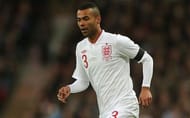
England’s full-backs were genuinely brilliant in the time of the Golden Generation; Manchester United’s Gary Neville, first capped under Terry Venables in 1996, was a battle-tested veteran by the time Euro 2004 and World Cup 2006 came around, but was still largely considered one of the world’s best right-backs. His defensive nous was phenomenal and his delivery from crosses was also very dangerous.
While today’s right-backs – Liverpool’s Trent Alexander-Arnold and Atletico Madrid’s Kieran Trippier – are arguably better going forward than Neville was, neither man possesses the defensive solidity of the Manchester United stalwart, and despite the changes in the way full-backs play over the past decade, the position remains largely a defensive one.
It’s probably fair to state, however, that Alexander-Arnold, Trippier, and Aaron Wan-Bissaka – who is likely next in line – are all superior to Neville’s eventual replacement, Glen Johnson of Liverpool.
At left-back meanwhile, the Golden Generation could call upon the services of Ashley Cole of Arsenal and eventually Chelsea. Although he wasn’t the most popular player with some fans, Cole amassed 107 caps for the Three Lions and was ever-present for England from the 2002 World Cup through to Euro 2012. He was named in the all-star squad for Euro 2004, and his epic duels with Cristiano Ronaldo in that tournament and in the 2006 World Cup remain legendary.
Today’s first-choice left-back, Ben Chilwell of Leicester City, has shown flashes of world-class potential since breaking into the England team in late 2018 – picking up three assists in November’s 7-0 win over Montenegro – but he has a long way to go before he can get close to Cole’s standard, something his predecessor and competitor, Tottenham’s Danny Rose, never quite managed.
Advantage: The Golden Generation
Centre-Backs: Sol Campbell, Rio Ferdinand, John Terry, Jamie Carragher vs. Harry Maguire, John Stones, Tyrone Mings, Joe Gomez, Kyle Walker
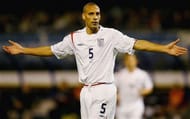
The amount of great central defenders available to Sven-Goran Eriksson, Steve McClaren and Fabio Capello during the time of the Golden Generation was simply ridiculous. Sol Campbell (Arsenal), Rio Ferdinand (Manchester United) and John Terry (Chelsea) were amongst the greatest defenders of the time, while the likes of Jamie Carragher (Liverpool) and Ledley King (Tottenham) were more than able deputies.
Campbell and Terry played together at Euro 2004 and performed well, but the 2006 World Cup was probably the highest point for England’s defence; the pairing of Terry and Ferdinand conceded just two goals across five games in that tournament and stood firm when the Three Lions were reduced to 10 men in the quarter-final meeting with Portugal, preventing them from scoring.
Southgate, meanwhile, has struggled to find a first-choice defensive partnership; Harry Maguire of Leicester and now Manchester United is clearly his best defender, but partnerships with John Stones (Manchester City) and Tyrone Mings (Aston Villa) have thus far only seen mixed results, with England’s defence looking definitively shaky in their 3-1 loss to the Netherlands in the UEFA Nations League semi-finals last summer.
In their successful 2018 World Cup campaign, Southgate used Manchester City’s right-back Kyle Walker as a third centre-back, but England’s defence looked equally questionable at times during the tournament and in the year that has followed, that experiment appears to have been stopped, with Walker no longer being picked for the squad.
Younger players like Joe Gomez (Liverpool) and Fikayo Tomori (Chelsea) may become world-class performers in the future, but for now the Golden Generation’s central defence must be considered stronger.
Advantage: The Golden Generation
Midfield: David Beckham, Frank Lampard, Steven Gerrard, Paul Scholes, Owen Hargreaves, Joe Cole vs. Jordan Henderson, Dele Alli, Jesse Lingard, Harry Winks, Declan Rice, Ross Barkley, Mason Mount
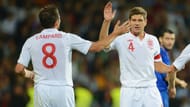
Like in defence, England’s Golden Generation was blessed with a crazy amount of world-class talent in midfield. In his prime, playing for Bayern Munich, Owen Hargreaves was a terrier of a holding midfielder, capable of harrying the opposition and winning the ball back before feeding it to his more attacking teammates. In the 2006 World Cup, he was named England’s Player of the Tournament.
In David Beckham (Manchester United and Real Madrid), Sven-Goran Eriksson could call upon both an inspirational captain – nobody will forget his last-gasp goal against Greece to send England to the 2002 World Cup – and a right-sided midfielder who could offer world-class delivery from both set-pieces and open play. It was Beckham’s free-kick that earned England their second-round victory over Ecuador in the 2006 World Cup.
Both Eriksson and Fabio Capello could never quite get the best out of central midfielders Steven Gerrard (Liverpool), Frank Lampard (Chelsea) and Paul Scholes (Manchester United); Scholes was wasted on the left side of midfield and retired from international football after Euro 2004, while Lampard and Gerrard were perhaps too similar to play together, but any of the trio would almost certainly walk into today’s side.
Joe Cole (Chelsea) meanwhile failed to live up to his massive potential, but in the 2006 World Cup, he was excellent and scored an outstanding goal in a group game against Sweden.
The amount of names representing Southgate’s modern era, on the other hand, should tell you that the current manager hasn’t quite worked out his best midfield yet. The 2018 World Cup saw Jordan Henderson (Liverpool) acting as both a holding midfielder and a deep-lying playmaker, with Dele Alli (Tottenham) and Jesse Lingard (Manchester United) further forward as attackers, but that system lacked creativity and the ability to retain the ball under pressure.
Since that tournament, Southgate has switched to a different system, with a deep-lying double-pivot protecting the defence and allowing more room for a more advanced playmaker; a combination of Henderson, Declan Rice (West Ham) and Harry Winks (Tottenham) has usually been used in the deeper positions, while Ross Barkley (Chelsea) and Mason Mount (Chelsea) have tended to act as the playmaker.
The system remains a work in progress, however, and while it may prove to be more balanced than the Gerrard/Lampard combination in the future, right now the nod goes to the Golden Generation for their depth in talent.
Advantage: The Golden Generation
Forwards: Wayne Rooney, Michael Owen, Peter Crouch, Jermain Defoe vs. Harry Kane, Raheem Sterling, Marcus Rashford, Jadon Sancho
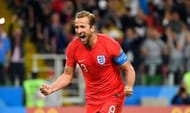
On paper, England’s Golden Generation was somewhat light when it came to forwards. Michael Owen (Liverpool and Real Madrid) – who broke through as a teenager during the 1998 World Cup – was a genuinely world-class striker in his prime, and he scored in four successive major tournaments for England. However, injuries ruined his career with the Three Lions and took him out of the equation in the 2006 World Cup – arguably England’s best chance of winning a trophy.
Wayne Rooney (Everton and Manchester United) meanwhile was the Golden Generation’s poster-boy; he broke onto the scene as an 18-year old at Euro 2004, scoring 4 goals, and only a broken foot stopped him from potentially inspiring England further than their eventual quarter-final finish.
He is currently England’s all-time leading goalscorer with 53 strikes, but it must be said that his performances in the 2006 and 2010 World Cups were disappointing, as he failed to find the net, and his red card at the former tournament arguably contributed to England’s quarter-final exit to Portugal.
Peter Crouch (Liverpool and Tottenham) and Jermain Defoe (Tottenham) were both used as deputies in the 2006 and 2010 World Cups, and both men scored a single goal respectively during those tournaments and performed admirably given they were never considered truly world-class players at international level.
Southgate’s current squad can boast one of world football’s most fearsome front lines. In the form of Tottenham’s Harry Kane, they can call upon the services of one of the world’s best strikers. Kane’s 6 goals won him the 2018 World Cup’s Golden Boot – the first English player to do so since Gary Lineker at the 1986 tournament – and in just 45 senior caps, he’s already scored 32 goals.
The 2018 World Cup saw Raheem Sterling largely used as Kane’s partner, and while the Manchester City man struggled during that tournament, since Southgate’s switch to a 4-3-3 system he has thrived massively, becoming almost as important to England’s hopes as Kane. Since scoring his first international goals in 3 years against Spain in October 2018, he’s delivered a further 8 to take his tally to 12 overall.
The 4-3-3 system has also allowed Marcus Rashford (Manchester United) and Jadon Sancho (Borussia Dortmund) to come to the forefront, both men competing for a spot alongside Sterling and Kane. Rashford appears to be slightly ahead right now, but both men have performed excellently in the past year, scoring a total of 9 goals between them since the end of the 2018 World Cup.
Despite Rooney and Owen having clear world-class talent, the edge has to go to Southgate’s modern crop here; England have more depth in their forward line than ever before and more to the point, as the main striker Kane has already delivered more in a single tournament than Rooney was able to in six.
Advantage: The Current Crop
Manager: Sven-Goran Eriksson, Steve McClaren, Fabio Capello vs. Gareth Southgate
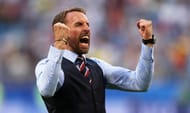
Many England fans would blame the FA’s choice of manager for the failures of the Golden Generation. Initially pegged as almost a messiah figure thanks to his overseeing of England’s miraculous qualification for the 2002 World Cup, Sven-Goran Eriksson later came under fire for several issues, notably his tactical rigidity when it came to sticking to a 4-4-2 formation, and his apparent protection of bigger ‘star’ players like David Beckham and Steven Gerrard, even when they were out of form.
The less said about Steve McClaren’s disastrous reign, meanwhile, the better. England failed to qualify for Euro 2008 under the former Middlesbrough man despite the likes of Wayne Rooney, John Terry and Frank Lampard arguably peaking for that tournament. His bizarre squad selection and awful tactical choices mark him out as perhaps the worst England boss ever.
Fabio Capello on the other hand oversaw a phenomenal qualifying campaign for the 2010 World Cup, but England’s performance at the tournament was dire, and the Italian’s man-management skills came into question, as did his own tactical rigidity, as like Eriksson, he largely refused to move away from a 4-4-2 system.
Gareth Southgate’s only tournament to date saw England’s best result since 1990; the Three Lions were unfancied but made it to the semi-finals of the 2018 World Cup, bringing the nation together in the process and even lifting the infamous curse around penalty shoot-outs with a stirring victory over Colombia.
Since that tournament, Southgate has already proven himself to be an underrated tactician, moving from a 3-5-2 formation to a 4-3-3 to get the best out of his formidable front line, and his dropping of the likes of Rooney, Joe Hart and now Kyle Walker and Jesse Lingard shows that he’s willing to be ruthless with star names if the need arises.
Southgate may be slightly unproven at the very top level and he hasn’t had the success at club level that Eriksson and Capello did, but in terms of England managers, this comparison is no contest.
Advantage: The Current Crop
In conclusion....
It’s probably fair to say that England’s Golden Generation were stronger in defence and in midfield, while the current crop of talent has a better goalkeeper and can call upon a more dangerous set of attackers. Overall though, the Golden Generation’s squad depth remains superior, for now at least.
It must be said, however, that the key area for both sides lies with their manager. In Eriksson, McClaren and Capello, the Golden Generation were cursed with three bosses who were unwilling to change things up when they needed to and simply couldn’t get the best out of a set of genuinely world class players.
Southgate meanwhile may not have as much talent to call upon, but despite his lack of experience he’s already shown that he can get the best out of the players at his disposal and is willing to modify his approach in his quest for success. One can only wonder, then, what England’s Golden Generation could’ve been capable of had they had a manager like Southgate in charge of them.
